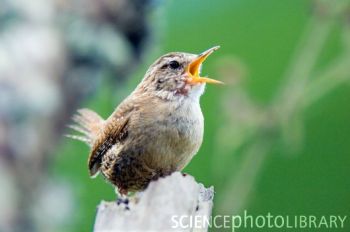
鹪鹩的某些脑部回路适合合作(图片来源:sciencephoto)
一对结婚很久的夫妇可以帮彼此说完说到一半的句子,但安第斯山脉的素尾鹪鹩所做的比这又更进了一步。
雄雌两性的鹪鹩哼着亲密的二重唱,并在哼唱时快速地更迭着音节,使得其听上去像是某单个的鸟在歌唱。 新的研究显示,雄雌两性鹪鹩的脑子实际上在处理整个的二重唱,而不只是每只鸟自己唱的部分。 这些发现令人惊讶,因为研究人员通常假设,每只鸣禽的脑部活动会大体上致力于该鸟自己的歌唱角色。
Eric Fortune及其同事在鹪鹩歌唱的时候躲在厄瓜多尔安提萨那火山上的竹林中给其录音。 在分析这些录音时,研究人员了解到,雌鸟似乎为该歌唱进行定时,雄鸟会在歌唱时偶尔犯错,而雌鸟则不会。 接下来,研究人员在重放这些鸟的二重唱以及独唱录音时记录了这些鸟在此期间其脑部的歌唱中心的活动。他们发现鹪鹩的脑部神经元对二重唱的反应最为强劲,表明其某些与人脑相同的脑部回路适合与同类进行彼此合作。
相关英文论文摘要:
Neural Mechanisms for the Coordination of Duet Singing in Wrens
Plain-tailed wrens (Pheugopedius euophrys) cooperate to produce a duet song in which males and females rapidly alternate singing syllables. We examined how sensory information from each wren is used to coordinate singing between individuals for the production of this cooperative behavior. Previous findings in nonduetting songbird species suggest that premotor circuits should encode each bird’s own contribution to the duet. In contrast, we find that both male and female wrens encode the combined cooperative output of the pair of birds. Further, behavior and neurophysiology show that both sexes coordinate the timing of their singing based on feedback from the partner and suggest that females may lead the duet.
英文论文链接:https://www.sciencemag.org/content/334/6056/666.abstract







